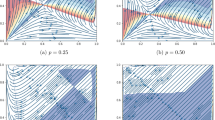Abstract
We study a dynamic contest between two players who compete against each other in \(n\) different stages. The players have winning values for each stage of the contest that may vary across the stages as well as heterogeneous resource budgets that decrease from a given stage to the next proportionally to the resources allocated in that stage. We characterize a subgame perfect equilibrium of this dynamic contest and show that when the winning value is equal between the stages, the players’ resource allocations are weakly decreasing over the stages. We also study the effect of several distributions of winning values on the players’ resource allocations. We show both the distribution of winning values that balances the players’ resource allocations and the distribution of winning values that maximizes the players’ total resource allocations.

Similar content being viewed by others
Notes
Matros (2006) studied elimination tournaments where, similarly to our model, players have budget resources instead of cost functions. However, an elimination tournament is different than our dynamic model because players in elimination tournaments do not have an incentive to deplete the budgets of their rivals in the first stages since the losers in each stage are eliminated before the following stages.
Ryvkin (2011) studied a different multi-stage contest known as the best-of \( k\) contest in which the players’ probabilities of winning in each stage depend on the players’ efforts in that stage as well as their efforts in the previous stages. He found that agents are more likely to exert higher efforts in the later stages of the contest which is the exact opposite of our findings.
References
Amegashie J, Cadsby C, Song Y (2007) Competitive burnout: theory and experimental evidence. Games Econ Behav 59:213–239
Borel E (1921) La theorie du jeu les equations integrales a noyau symetrique. Comptes Rendus de l’Academie 173, 1304–1308; English translation by Savage L (1953) The theory of play and integral equations with skew symmetric kernels. Econometrica 21:97–100
Ferral C, Smith A (1999) A sequential game model of sports championship series: theory and estimation. Rev Econ Stat 81:704–719
Fu Q, Lu J (2012) The optimal multi-stage contest. Econ Theory 51(2):351–382
Harbaugh R, Klumpp T (2005) Early round upsets and championship blowouts. Econ Inq 43:316–332
Hart S (2008) Discrete Colonel Blotto and general lotto games. Int J Game Theory 36:441–460
Klumpp T, Polborn M (2006) Primaries and the New Hampshire effect. J Public Econ 90:1073–1114
Konrad KA (2004) Bidding in hierarchies. Eur Econ Rev 48:1301–1308
Kovenock D, Roberson B (2009) Is the 50-state strategy optimal? J Theor Politics 21(2):213–236
Kvasov D (2007) Contests with limited resources. J Econ Theory 136:738–748
Matros A (2006) Elimination tournaments where players have fixed resources. Pittsburgh University, Working paper
Moldovanu B, Sela A (2006) Contest architecture. J Econ Theory 126:70–96
Roberson B (2006) The Colonel Blotto game. Econ Theory 29:1–24
Rosen S (1986) Prizes and incentives in elimination tournaments. Am Econ Rev 74:701–715
Ryvkin D (2011) Fatigue in dynamic tournaments. J Econ Manag Strateg 20(4):1011–1041
Schmitt P, Schupp R, Swope K, Cardigan J (2004) Multi-period rent-seeking contests with carryover: theory and experimental evidence. Econ Gov 5:187–211
Snyder JM (1989) Election goals and the allocation of campaign resources. Econometrica 57:637–660
Tullock G (1980) Efficient rent-seeking. In: Buchanan JM, Tollison RD, Tullock G (eds) Toward a theory of rent-seeking society. Texas A &M University Press, College Station
Warneryd K (1998) Distributional conflict and jurisdictional organization. J Public Econ 69:435–450
Acknowledgments
We would like to thank Dan Kovenock for for his helpful comments.
Author information
Authors and Affiliations
Corresponding author
Rights and permissions
About this article
Cite this article
Sela, A., Erez, E. Dynamic contests with resource constraints. Soc Choice Welf 41, 863–882 (2013). https://doi.org/10.1007/s00355-012-0711-1
Received:
Accepted:
Published:
Issue Date:
DOI: https://doi.org/10.1007/s00355-012-0711-1




